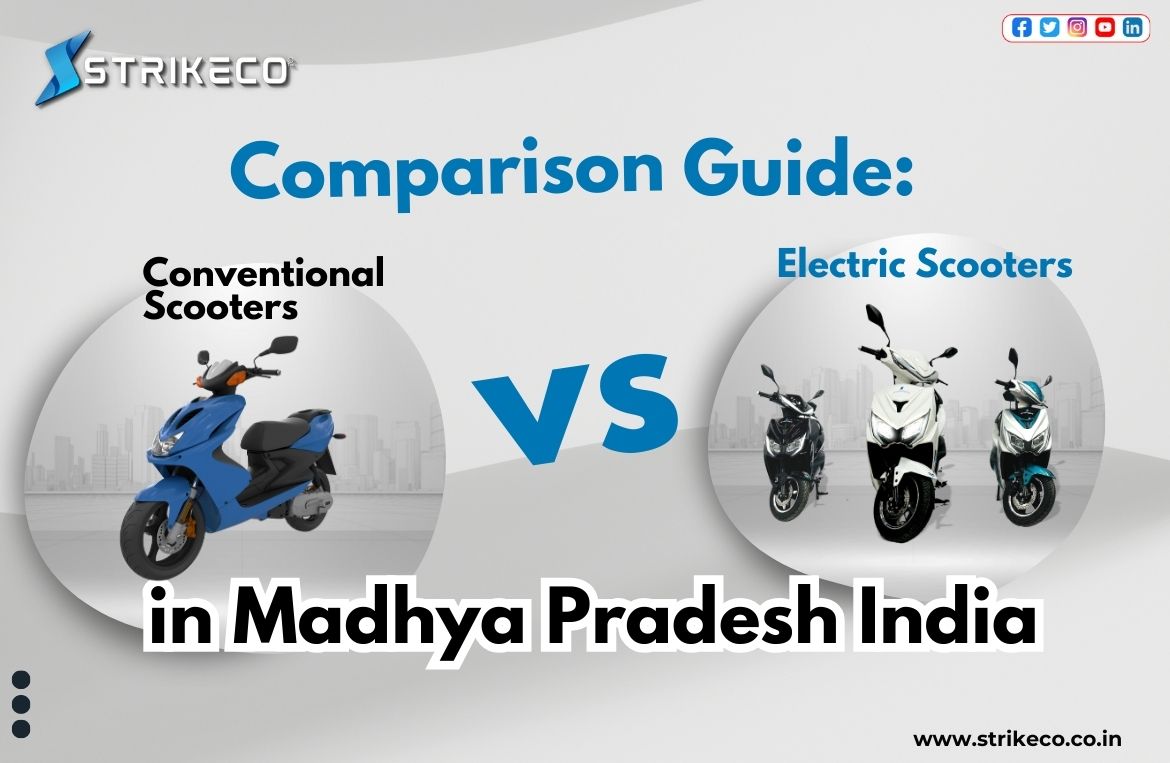
Madhya Pradesh, situated in the heart of India, is witnessing a transformation in its urban mobility landscape. As the state continues to develop and urbanize, the need for efficient and sustainable transportation solutions becomes increasingly critical. In this context, the debate between electric scooters and conventional petrol-powered scooters has gained significant traction. This guide provides a
comprehensive comparison of electric scooters and conventional scooters in Madhya Pradesh, helping residents make informed decisions about their commuting options.
Understanding Electric Scooters
Electric scooters in Madhya Pradesh are battery-powered two-wheelers designed to offer an eco-friendly alternative to traditional scooters. They run on electric motors and rechargeable batteries, providing a
quiet, emission-free ride.
Understanding Conventional Scooters
Conventional scooters, on the other hand, are powered by internal combustion engines that run on petrol. These scooters have been the traditional choice for daily commuting due to their widespread availability
and established infrastructure.
Key Comparison Factors
1. Environmental Impact
Electric Scooters:
Produce zero emissions, contributing to cleaner air quality.
Operate quietly, reducing noise pollution in urban areas. Use renewable energy sources, aligning with sustainable transportation goals.
Conventional Scooters:
Emit harmful pollutants, contributing to air pollution and greenhouse gas emissions. Generate noise, adding to the urban noise pollution.
Depends on fossil fuels, which are finite and contribute to environmental degradation.
2. Cost of Ownership
Electric Scooters:
Lower operational costs due to cheaper electricity compared to petrol.
Require minimal maintenance, as they have fewer moving parts and no oil changes. Government subsidies and incentives can reduce the initial purchase cost.
Conventional Scooters:
Higher fuel costs, as petrol prices are subject to fluctuations.
Regular maintenance is required, including oil changes and engine servicing.
Initial purchase costs may be lower, but long-term expenses are higher due to fuel and maintenance.
3. Performance and Range
Electric Scooters:
Offer smooth and quiet acceleration.
Range varies depending on battery capacity, typically between 60-100 km on a full charge. Suitable for city commuting but may require charging infrastructure for longer trips.
Conventional Scooters:
Provide longer range on a full tank, typically 200-300 km.
Well-suited for longer commutes and intercity travel.
Familiar performance dynamics, including quick refueling at petrol stations.
4. Convenience and Infrastructure
Electric Scooters:
Require access to charging stations or home charging setups.
Charging time ranges from 3 to 8 hours, depending on the battery and charger type.
Battery swapping stations are emerging as a convenient alternative.
Conventional Scooters:
An extensive network of petrol stations ensures quick and easy refueling.
No need for specialized infrastructure beyond regular servicing centers.
Familiarity with usage and widespread availability of spare parts.
5. Government Policies and Incentives
Electric Scooters:
Beneficiaries of various government incentives, including subsidies and tax benefits under schemes like FAME India.
Encouraged by policies aimed at reducing carbon emissions and promoting renewable energy.
Conventional Scooters:
Fewer incentives as the focus shifts towards promoting cleaner alternatives. Subject to increasing fuel prices and potential future regulations aimed at reducing emissions.
Specific Considerations for Madhya Pradesh are listed below.
Urbanization and Traffic:
Madhya Pradesh is witnessing rapid urbanization, leading to increased traffic congestion in cities like Bhopal and Indore. Electric scooters, with their compact size and agility, offer a viable solution for navigating through crowded streets.
Climate and Terrain:
The diverse climate and terrain of Madhya Pradesh require scooters that can handle different conditions. Electric scooters, with their robust build and modern features, are well-suited for varied environments,
from the hot summers to the hilly terrains.
Charging Infrastructure Development:
The development of charging infrastructure in Madhya Pradesh is crucial for the widespread adoption of electric scooters. Efforts are underway to establish more charging stations in urban areas, enhancing the
convenience for electric scooter users.
Choosing between electric scooters and conventional scooters in Madhya Pradesh depends on various factors, including environmental impact, cost of ownership, performance, convenience, and government
incentives. While conventional scooters offer familiarity and long-range capabilities, electric scooters provide a sustainable, cost-effective, and modern solution for urban commuting.
As Madhya Pradesh continues to evolve, the adoption of electric scooters is poised to grow, driven by advancements in technology, supportive government policies, and increasing environmental awareness.
For residents of Madhya Pradesh, electric scooters represent a forward-thinking choice that aligns with the state's goals for sustainable and efficient urban mobility.